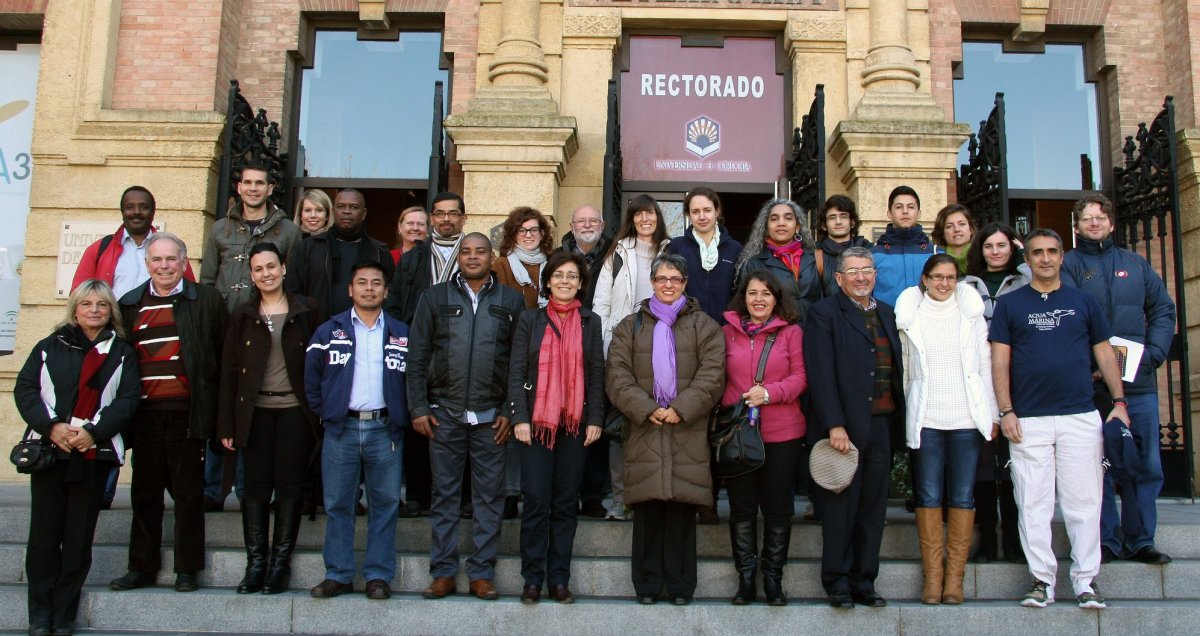
International Innovation es una de las publicaciones líder a nivel mundial para la comunidadcientífica en general, la tecnologíay la investigación, dedicadaa la difusión delos últimos avances en este ámbito.Más información en:www.researchmedia.eu.
Aquí podeis encontrar la entrevista completa a la Prof.ra Mª Del Mar Delgado, coordinadora del proyecto COMET-LA.
Here you can find the COMET-LA e-Newsletter nº 2 (January 2013). It describes important progress of the project during the last six months.
![]() NewsletterCOMET-LAjanuary2013.pdf
NewsletterCOMET-LAjanuary2013.pdf
Enjoy it!
The IADO-CONICET, UNS and Aquamarina stress the need for an integrated management of water resources of the estuary.
Bahia Blanca, 1/2/2013.- Bahía Blanca estuary is a habitat for biodiversity conservation. This wetland area designated as an Important Nearctic Migratory Bird Conservation in the Southern Cone of South America, hosts endangered species such as olrog’s gulls or salicornia rings, but it is highly vulnerable, because it has a water turnover rate very low. In the context of the World Wetlands Day, the Argentine Institute of Oceanography (IADO) belonging to CONICET, theUniversidad Nacional del Sur (UNS) and the NGO Aquamarina, insist that it is necessary to develop a strategy for Integrated Water Resources Management in the estuary.
Between 12 and 20 February the annual coordination meeting of the project COMET-LA (Community-based Management of Environmental Challenges in Latin America) has taken place. COMET-LA has the ultimate objective to create a 'learning arena' for integrating local and scientific knowledge in the management and sustainable governance of different social-ecological systems (SES), with special emphasis on those based on community management natural resources.
La reunión se inició en la Universidad de Córdoba, analizando los avances realizados en la caracterización de sistemas socio-ecológicos usando metodologías participativas y adaptadas a las realidades locales y consensuando los enfoques metodológicos a utilizar en el segundo año. En este segundo año se realizará un análisis estructural de prospectiva para identificar las variables clave que pueden influenciar la evolución de los SES.
Con el objetivo de contribuir a esta arena de aprendizaje, además de las reuniones metodológicas se han realizado diferentes visitas de terreno para conocer iniciativas de manejo sostenible de recursos naturales en Europa. Así, el día 15 se visitaron las instalaciones de la planta de energía temosolar La Africana en Posadas (Córdoba) y de la Agroenergética de Baena dónde se usan los residuos de biomasa producidos por el olivar para producir electricidad.
Entre los días 16 y 20, Sagremarisco, el socio portugués de COMET-LA organizó una visita de campo a los sistemas socio-ecológicos marinos de los Parques Naturales de la Ría Formosa y Cabo San Vicente que ha permitido contrastar las similitudes y las diferencias entre los SES de ambos continentes. Se han analizado las problemáticas existentes en ellos y se ha interaccionado con actores locales.
COMET-LA analiza los sistemas socioecológicos de tres casos de estudio: la gestión forestal y el uso del suelo por la comunidad chinanteca de Santiago Comaltepec, en México; el manejo de la biodiversidad y los recursos hídricos por parte de los Consejos Comunitarios de las Comunidades Negras de Bajo Calima y Alto y Medio Dagua, en Colombia; y la gestión costera y marina del entorno del estuario argentino de Bahía Blanca.
El consorcio de COMET-LA está formado por once entidades científicas y locales de Europa y Latinoamérica: la Universidad de Córdoba, la Universidad Nacional Autónoma de México (UNAM) y la Asociación Civil de Estudios Rurales y Asesoría Campesina, en México; la Pontificia Universidad Javeriana y los Consejos Comunitarios de las Comunidades Negras de la Cuenca Baja del Río Calima y el Alto y Medio Dagua, en Colombia; el Instituto Argentino de Oceanografía (IADO-CONICET), y la Fundación Aquamarina en Argentina; el Instituto Noruego de Luftforskning; The James Hutton Institute, del Reino Unido; la empresa portuguesa Sagremarisco y el Comité Español de la UICN (Unión Internacional para la Conservación de la Naturaleza).

The National Autonomous University of Mexico (UNAM)has published in its Newsletter (Official information body of the UNAM, with information on the activities of the university community like news, events, conferences, seminars, courses, research, etc.) a new about the annual coordination meeting of COMET-LA members.
Enjoy it!
The winners will be proclaimed in July, during COMET-LA´s team visit to Latin America
Under the slogan: "How do you imagine the future of your community?" Primary and secondary schools in the communities where COMET-LA works have launched their imagination and embodied in a drawing of how they imagine their community within a few years. More than 700 young people from Santiago Comaltepec, in Mexico, the communities of La Delfina and Zaragoza, in Colombia, and the estuary of Bahia Blanca in Argentina, participate in this call. The winners will be selected in July during COMET-LA´s research visit to each of the three countries.
Given its involvement in the subject, the project COMETLA participates today on the World´s Day of Biodiversity, which this year has the theme "Water and Biodiversity", remembering that biodiversity and water resources are essential to ensure important aspects of human development such as food security, CO2 uptake, and production of medicinal plants.
President of Konex Foundation, Dr. Luis Ovsejevich and President of the Grand Jury Award Konex 2013, Dr. Mario A. J. Mariscotti, reported that the Grand Jury has selected the 100 most prominent personalities in the last decade of Science and Technology in Argentina (2003-2012), formed by the appointment of quintets in 20 disciplines.
Pepa Ambrosio, researcher of COMET-LA from the University of Córdoba team, was speaker on the Summer School “ Adaptation Governance: Spatial, Temporal, and Cultural Constraints and Opportunities” organised by Central European University and co-organised byVrije Universiteit Amsterdam, Alpen-Adria-Universität Klagenfurt.
Maria del Mar Delgado, COMET-LA coordinator, and Tania de la Fuente, project partner coordinator on behalf of CeUICN, attended the meeting organized by the European Commission that took place in Brussels on 10th and 11th June: "Fostering innovative dialogue between researchers and stakeholders to meet future challenges: Land, Soil, Desertification, Urban and Community-Based Environmental Management".